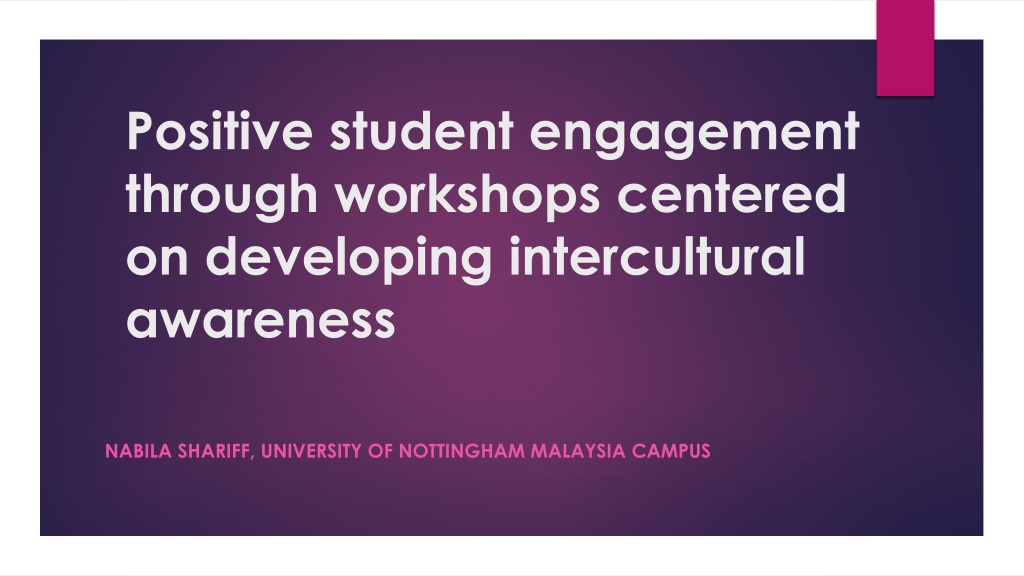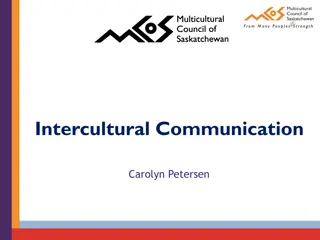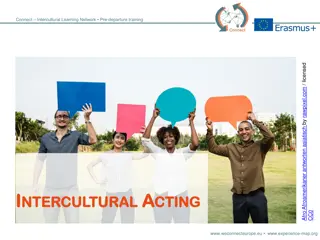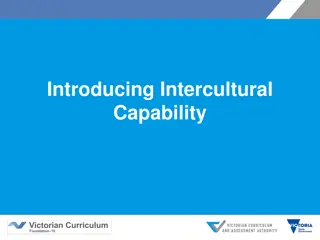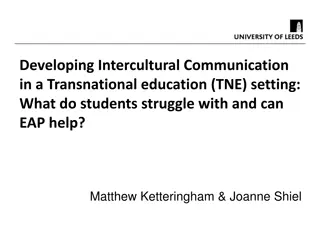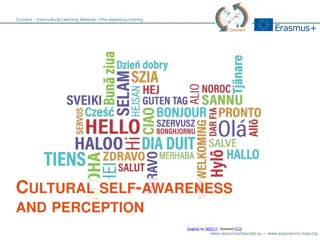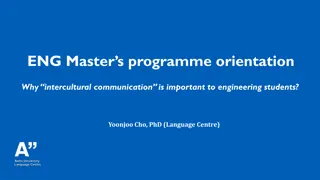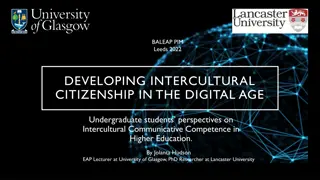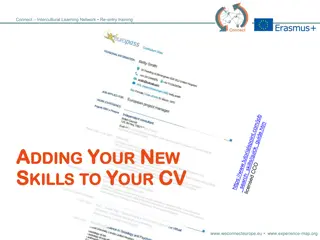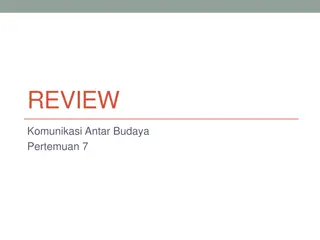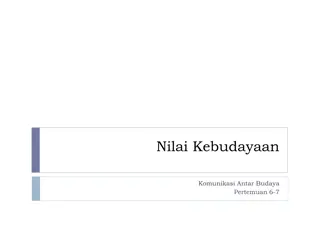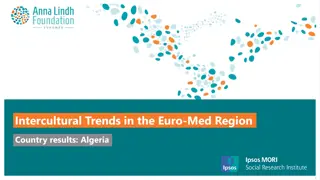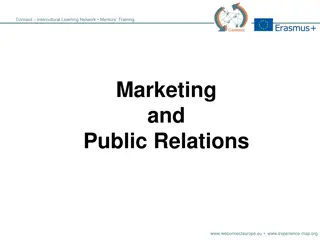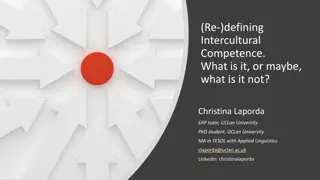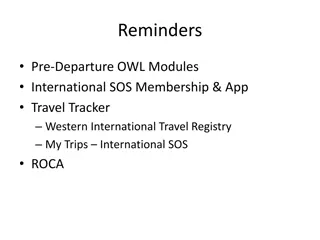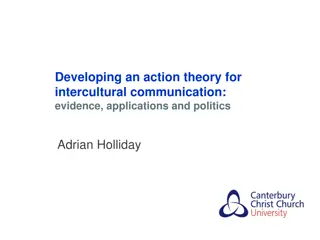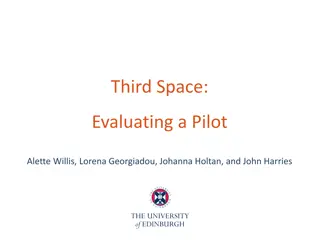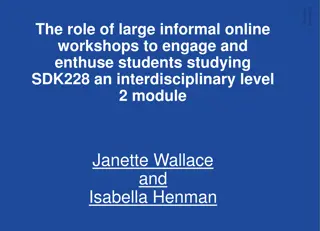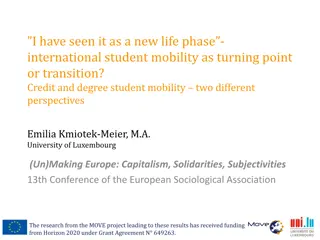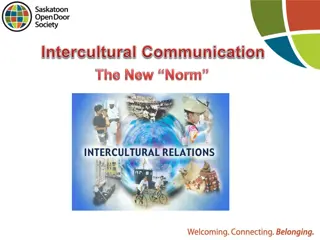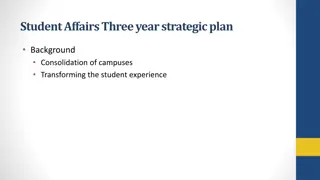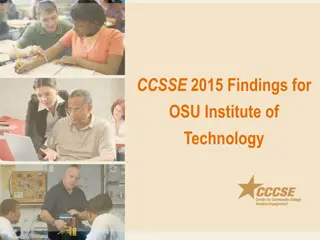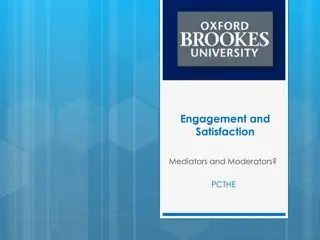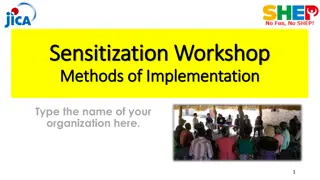Enhancing Student Engagement with Intercultural Awareness Workshops
Explore the impact of workshops on intercultural awareness led by Nabila Shariff at the University of Nottingham Malaysia Campus. Delve into the definition of culture, varied perceptions, and engaging activities like "The Grocery Store" scenario and discussions on cultural factors influencing outcomes. Main workshop themes include morality, time perception, and culture shock, fostering a deeper understanding of cultural differences and problem-solving approaches.
Download Presentation

Please find below an Image/Link to download the presentation.
The content on the website is provided AS IS for your information and personal use only. It may not be sold, licensed, or shared on other websites without obtaining consent from the author. Download presentation by click this link. If you encounter any issues during the download, it is possible that the publisher has removed the file from their server.
E N D
Presentation Transcript
Positive student engagement through workshops centered on developing intercultural awareness NABILA SHARIFF, UNIVERSITY OF NOTTINGHAM MALAYSIA CAMPUS
OUTLINE Working definition(s) of culture Intercultural Awareness (module of sorts) General perception of module workshops and content (pre- & post workshop, based on student feedback)
Students were expected to rank from 1-5 (1 most likely, 5 least likely to happen) You will be: a) Ignored b) The item of desire bought for you c) You and your parent/guardian will leave the shop d) You will be disciplined e) .(own option)
All the factors that come into play (upbringing, personalities, and cultures are what may determine the outcome of many of these situations. Culture is the way in which we may attempt to solve problems/conflicts.
Culture refers to the cumulative deposit of knowledge, experience, beliefs, values, attitudes, meanings, hierarchies, religion, notions of time, roles, spatial relations, concepts of the universe, and material objects and possessions acquired by a group of people in the course of generations through individual and group striving (Hofstede1997)
Main themes of the workshops Started as 3 workshops but then divided into 4 Each 2 hour workshop included different kinds of activities and the main themes centered around: - Morality (human behavior in certain situations) & dichotomies - Perception of time and its flexibility (sequential vs synchronic) - Culture shock
The Car Accident Students were given a situation (like this one) and asked to discuss where they would put rate , with an X, their acceptance
Universalist Focus is more on rules than relationships Legal contracts are readily drawn up A trustworthy person is the one who honors his or her word or contract There is only one truth or reality which has been agreed to A deal is a deal You cannot trust a particularist, they only help their friends
Particularist Focus is more on relationships than on rules Legal contracts are readily modified A trustworthy person is the one who honors changing mutualities There are several perspectives on reality relative to each participant Relationships evolve You cannot trust a universalist, they wouldn t even help a friend
Assessment Reflective logs Each stage of the reflective log required them to answer questions: Pre-workshop: - What did you expect to learn? Workshop 1, 2, 3, 4: - What did you learn and how does this change the way you perceive yourself and those around you? In terms of cultural perception? Post- Workshops: - What was most challenging/least challenging and - Feedback you want to give/comments on the module/recommendations for those who want to take this in the future
What has kept the majority engaged (3 years, 80+ students and still going strong)? 1)Freedom to be able to explore themselves as people/entities without the feeling of being judged 2)The freedom to express tolerance/doubt
Reflective Log feedback excerpts One of the key benefits of learning about cultures is that it really open our minds about other people s preference, responses and behaviours. My advice is simple, keep an open mind and participate in the discussions with fellow students in this course. Although it might be uncomfortable sharing your thoughts on a certain topic, this is how one engages in a healthy discussion. Apart from expanding ones mindset on a certain topic of discussion, one could also learn and experience views that may vary depending on the cultural background and upbringing of the participating students.
I would advise anyone planning to take this module to come with an open mind. Come with an open mind. .you can share your views without being judged. I would advise the future students to come into the workshops with an open mind, be ready to speak out and not be afraid. No opinion will be judged and there is so much to learn from everything everyone says.
Main challenges (among others) Time Group size (in terms of discussions) Scheduling of workshops
References Hofstede, G. (1997). Cultures and Organizations: Software of the mind. New York: McGraw Hill. Spencer-Oatey, H. (2012) What is culture? A compilation of quotations. GlobalPAD Core Concepts. Available at GlobalPAD Open House http://www2.warwick.ac.uk/fac/soc/al/globalpad/interculturalskills/ Hampden-Turner, Charles and Fons Trompenaars. (2002). Building Cross- Cultural Competence: How to Create Wealth from Conflicting Values. New Haven & London: Yale University Press. Belbin, M., Covey, S et al. (2012). Cross-Cultural Management Textbook. Great Britain: Amazon.co.uk
